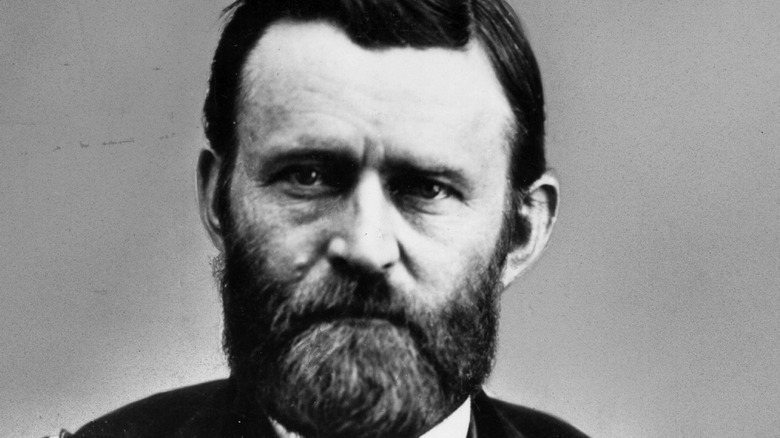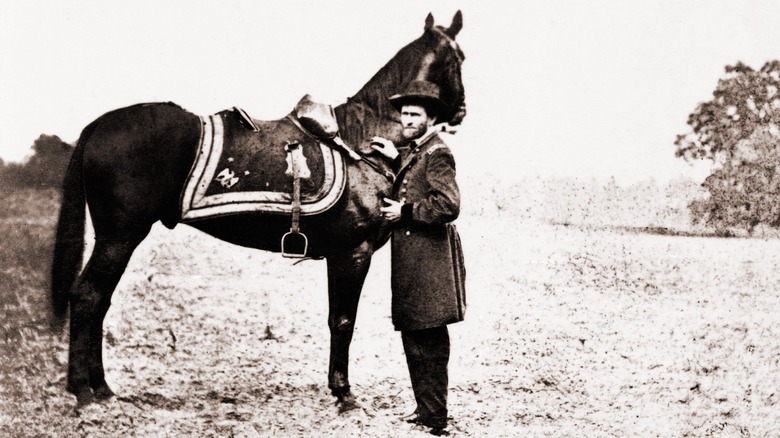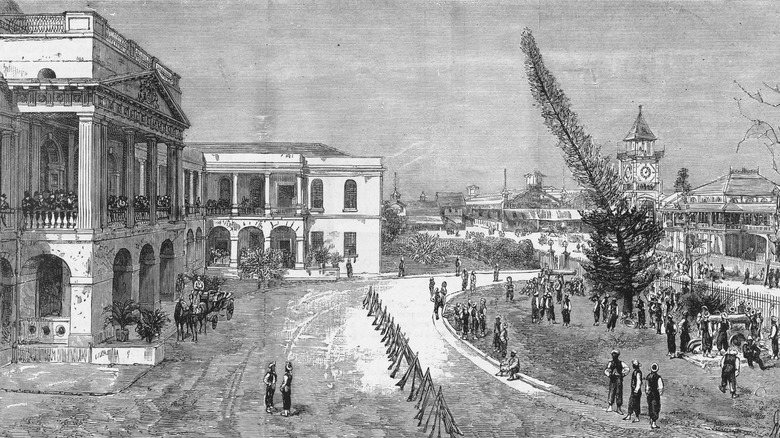The Only President To Be Arrested (So Far)
Union military leadership during the early stages of the American Civil War was extraordinarily inconsistent, essentially becoming a revolving door of several generals who were too inexperienced, incompetent, or fearful to conduct a war on such a scale. Ulysses S. Grant in many ways turned the tables on this trend. He was not a flawless military prodigy at first, in fact, he was a reluctant one. According to the White House, he was sent "rather against his will" to West Point where he was an average cadet. He then fought in the Mexican war before returning to Ohio to work for his father, a tanner. When the Civil War broke out, the governor of that state-appointed Grant to lead a group of volunteer troops who lacked discipline. Grant made soldiers out of them, and for that was promoted to "brigadier general of volunteers."
His status as essentially a functioning alcoholic might not have come across as all that impressive compared to those of his peers (via HistoryNet), but he managed to prove himself a competent enough leader. As a colonel, his performance eventually shined through the smog of stagnation and defeat that the other commanders left behind. Once promoted to General of the Army, Grant led the Union to victory, carving paths deep into Confederate territory as his scorched earth policy deprived the enemy of much-needed food and other supplies. His popularity was so great that in 1869 he became the 18th president of the United States. While Grant had his fair share of scandals while in office, one personal mishap is surprisingly relatable for a time when automobiles were decades away from being invented.
Grant was a repeat offender when he was arrested for speeding
Speeding laws have existed since 1652 when restrictions were set for horses and horse-drawn carriages in what would become New York City (via Martson Law). According to Lampham's Quarterly, the average speed limit for horses and horse-drawn buggies in populated areas was around 8 mph. In 1872 this was very much still the case when President Grant found himself cited for speeding.
A description of the incident written in 1908 in the Star Tribune describes Grant as liking to "let her out" on occasion. On that day he "whooped it up," running his two grey mares through Georgetown.
Officer West, who was coincidentally a Black veteran of the Civil War, recounted the story to the Star Tribune, saying he observed Grant racing through the streets of Washington D.C. via horse and carriage. West initially stopped Grant and allowed him to carry on with just a warning.
While Grant was a sitting president, West was compelled to stop him because around that time there'd been several injuries from people speeding their horses around town. West said, "You will excuse me Mr. President but you are violating the speed law and there have been a number of complaints. Several women have been hurt. As the head of the nation, you are setting a very bad example" (per the Star Tribune).
Grant said he was sorry and went on his way. But he wasn't that remorseful, it seems, because the next day he did it again.
Grant paid a fine
The next day, West found the President repeating the offense. Not only was he speeding, but according to Cathy Lanier, the D.C. Police Cheif in 2012, "He actually was racing his buggy on M street, where he was taken into custody," per WTOP.
Reluctantly yet firmly, the officer again approached Grant and informed him that this time he was under arrest. This time, according to the Star Tribune, West said, "I am very sorry Mr. President but I must do my duty even if you are the head of the nation. I warned you yesterday, now I must place you under arrest."
Grant was in fact no stranger to arrest for this offense, as he was previously booked for it in 1866. Yet as Grant complied and went with the officer to the local jail, his status as the president gives the offense radically different optics (via Ghosts of DC). While he did not fight the charges leveled against him, he did not stay captive for long and left after paying a $20 fine (about $450 when adjusted for inflation). Though he paid the fine and walked home to the White House, he did not show up to court, but by all accounts, that was not an issue. According to Business Insider, the officers weren't really sure if they could even charge a sitting president. But the fine was paid and it seems Grant did not continue to speed his horses through the city.


